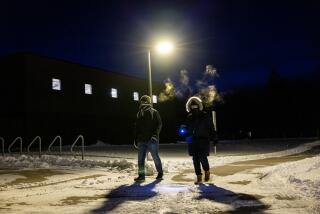Technology Makes ‘Unavailable People Available’ : Students Talk to Bush, Dukakis Via Computer
- Share via
WHITTIER — The sixth-graders were discussing Vice President George Bush’s position on the reduction of nuclear weapons.
“I think Bush is right,” said 11-year-old Jimmy Chilczuk. “I think you should, like, get rid of nuclear weapons but we should stay strong.”
“I think he should get rid of some of the real dangerous weapons but leave us with the good ones we can protect ourselves with,” said Andy Petrell, 11.
“But if he wanted to leave us with the good ones, they could still blow up cities,” countered Steven Josefson, 11.
Response to Questions
The Andrews Elementary School class was not analyzing news reports or the presidential debates. The students were talking about Bush’s personal response--via computer--to questions they had asked a week earlier. The class is one of nine in the country to use a national computer network to ask questions of Bush and his Democratic opponent, Michael S. Dukakis.
“Where we once used to write letters, we now use computers,” said teacher Bonnie Price, a specialist in telecommunications technology who signed up the class for the project. “The children are using high technology to make unavailable people available.”
The idea of using a computer to ask questions of the candidates came from Jon Gordon, a University of Minnesota political science student. Gordon works part time for the McGraw Hill Information Exchange, a 3,900-member computer network of educators interested in telecommunications technology. Within two days of announcing the project on the computer network, Gordon had filled the nine available slots with schools from Minnesota, California and Massachusetts.
Price’s class had used the network for other projects, such as becoming pen pals with a group of Alaska students and entering a contest in which different schools around the nation plant seeds at the same time and compare growth.
Important Lesson
But in the opportunity to ask questions of Bush and Dukakis, Price saw a more important lesson.
“It really increases the kids’ sense of access. They’re not going to feel so alienated,” Price said. “They realize they can make a difference and people will listen to them.”
Indeed, the students had many more questions for the candidates than the two that could be submitted. Among the topics of interest were homelessness, the environment, defense spending, space exploration, abortion and the death penalty.
Each student submitted one question for Bush, and Price picked two out of a hat. The questions were: “If you become President are you going to have peace talks to get rid of nuclear weapons?” and “When elected President, what major program or decision will you make to improve our future?”
In response to the question on nuclear weapons, Bush praised the Intermediate Nuclear Forces treaty signed by President Reagan but cautioned against agreeing to a freeze on weapons production. The treaty, agreed to by the United States and the Soviet Union, eliminated an entire class of intermediate-range nuclear missiles.
‘Desire for Peace’
“In our desire for peace,” Bush wrote, “we cannot be stampeded into unwise decisions that weaken our position as the leader of the free world.”
On programs for a brighter future, Bush said he wants to be known as the “education President” and would like more young people to be involved in citizen and community service.
After receiving Bush’s responses, the class decided to ask the same questions of Dukakis so the answers could be compared. Dukakis’ replies are expected before Tuesday’s election, Price said. The students can also use the computer network to review the replies to questions asked by other classes.
Price also tries to convert the enthusiasm the youngsters have for the project into a broader lesson about politics, emphasizing the importance of voting and voter information. Her class includes students born in Lebanon, Mexico, Ecuador, West Germany, Taiwan and Argentina, and she asked for comment about how elections operate in other countries.
Everybody Votes
“In Argentina, people ride around in cars a lot and everybody can vote,” Chilczuk said.
Francois Tabbakh, an 11-year-old from Lebanon, recalled, “We used to have fights with those Turkeys.”
“We call them the Turkish people,” Price corrected with a smile.
After class, Price added, “These kids aren’t jaded enough yet to think, ‘(The candidates) don’t care about me.’ This is a way of capturing them before they became jaded and hook them into the idea of being heard by these people. I don’t want them to become blase and disenfranchised.”
After the discussion, the students were asked which candidate they favored. The score was Bush, 20; Dukakis, 3.
More to Read
Get the L.A. Times Politics newsletter
Deeply reported insights into legislation, politics and policy from Sacramento, Washington and beyond. In your inbox twice per week.
You may occasionally receive promotional content from the Los Angeles Times.










